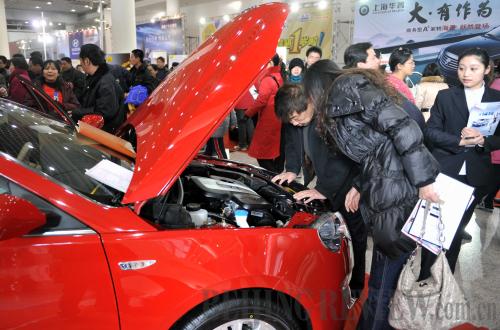|
Closer watch over the domestic financial system would help fend off inflation, while full use of monetary policies could stimulate employment opportunities and development of financially distressed small and medium-sized enterprises.
Economic rebalancing
The Central Economic Work Conference emphasized the growing need to accelerate the rebalancing of the economy to pursue quality growth.
 |
|
BUYING RUSH: Customers examine cars at an auto exhibition in Jinan, capital of Shandong Province (ZHU ZHENG) |
If China learns one lesson from the economic slowdown, it should be focused on a reliance on domestic demands for continued growth, Wang said.
"The past model—a blind chase of rapid growth—is no longer suitable for the Chinese economy," he said.
Yao Jingyuan, chief economist with the National Bureau of Statistics, said the conference has sent a strong signal that economic priority for 2010 is set on putting the economy onto a more sustainable track.
In past decades, investments and exports were the largest drivers of the economy. But the near collapse of the Chinese export market has displayed the urgency to look for economic vitality from within.
To rebalance the economy, China can spur the agricultural and service sectors to rely more on the domestic industry. Kicking off a vibrant consumer market to take pressure off investments and pressing ahead with technological advances and innovations are other important tasks to the rebalancing process, Yao said.
China's industrial structures also need further improvements, citing the nation's infrastructure projects as a prime example, Yao said. As part of the government stimulus announced last year, many infrastructure projects passed through loose review processes before construction commenced, leading to a slew of current environmental problems, such as increased pollution and energy depletion.
Policymakers at the conference clarified that more efforts will be made to improve China's economic systems. For example, the evaluation system of local governments' economic performance should be focused on rebalancing and innovation, which will provide an effective catalyst for the restructuring process, said Yao.
The most promising feature for the Chinese economy in 2010 will be the significant uptick in the quality of general economic development, said Zhou Tianyong, Deputy Director of the Research Office of the Party School of the Central Committee of the Communist Party of China.
"A number of emerging businesses, like the environment-friendly and energy-efficient industries and innovative hi-tech industries, will be future pillars of the Chinese economy," said Zhou.
Boosting domestic consumption
Consumption should play a more significant role in holding up the economy, policymakers at the conference stressed, while proposing a series of measures to spur China's consumer market: bolstering household consumption; bridging the income gap between the rich and the poor; as well as helping low-income groups.
The conference noted that rural areas have great potential for consumption prosperity.
As part of the country's rural revitalization campaign, policymakers handed out generous incentives this year to rural residents, including heavy subsidies for home appliance and automobile purchases.
The stiff efforts are already paying off. In the first three quarters of 2009, China's GDP grew 7.7 percent year on year, of which 4 percentage points came from domestic consumption, the highest ratio in the past 10 years.
Delivering a further boost to rural consumption, those at the conference vowed to continue the subsidies and other favorable policies for rural residents. Efforts will also be made to meet rural housing needs and improve the social safety net.
Meanwhile, the conference policymakers pledged to keep soaring investments under control and step up oversight on upcoming projects.
Li Kang, chief economist with the Hunan Province-based Xiangcai Securities Co. Ltd., said China has considerable room for consumption improvements.
"This means China is now in a good position to prop up its consumer market," said Li. | 